Brexit: Challenges and Impact on UK Economy
VerifiedAdded on 2023/01/12
|8
|2688
|75
AI Summary
This report discusses the history of Brexit, challenges faced by the UK as a member of the EU, and the impact of Brexit on the UK and other member nations' economy. It also explores the issues faced by manufacturing firms in exporting goods.
Contribute Materials
Your contribution can guide someone’s learning journey. Share your
documents today.
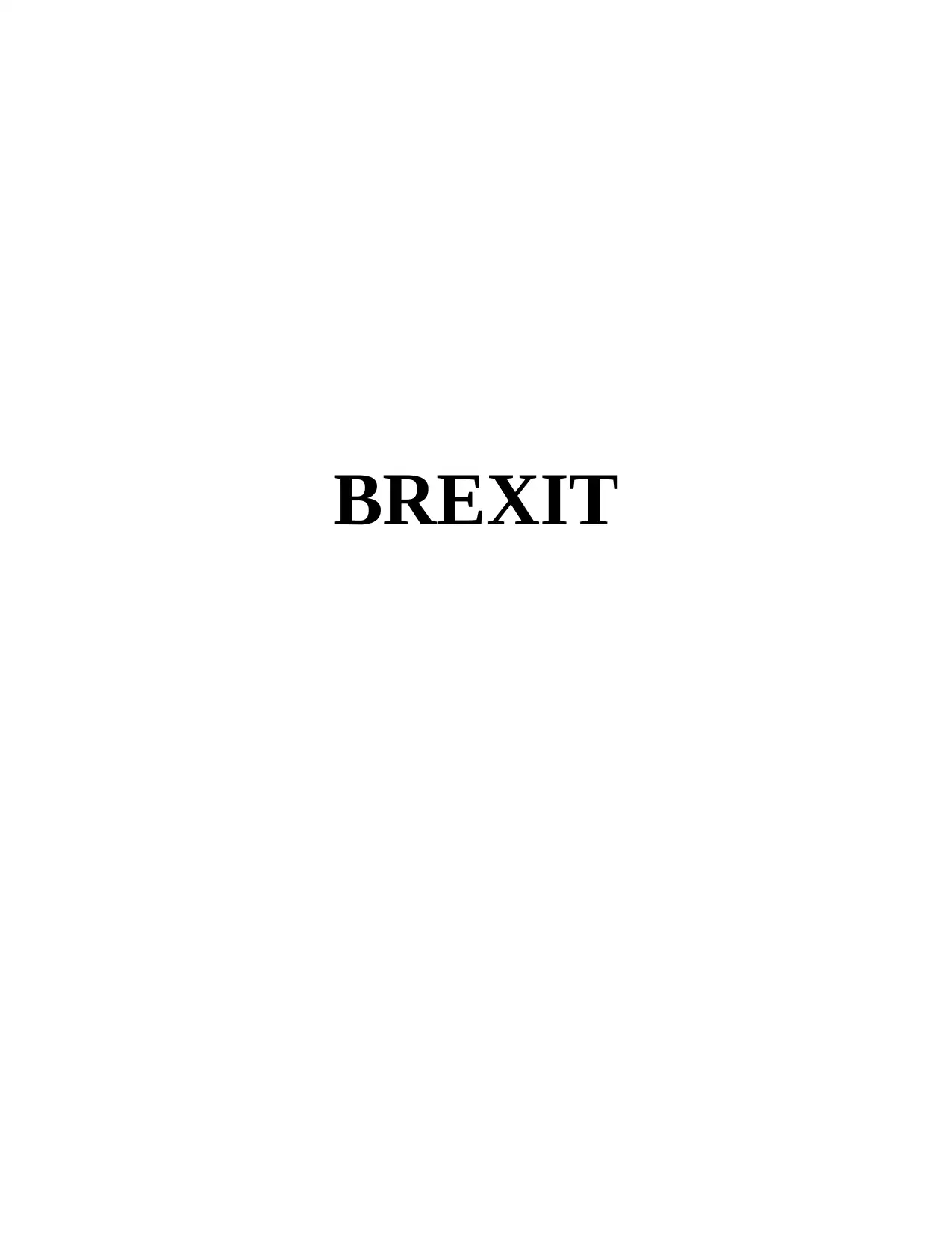
BREXIT
Secure Best Marks with AI Grader
Need help grading? Try our AI Grader for instant feedback on your assignments.
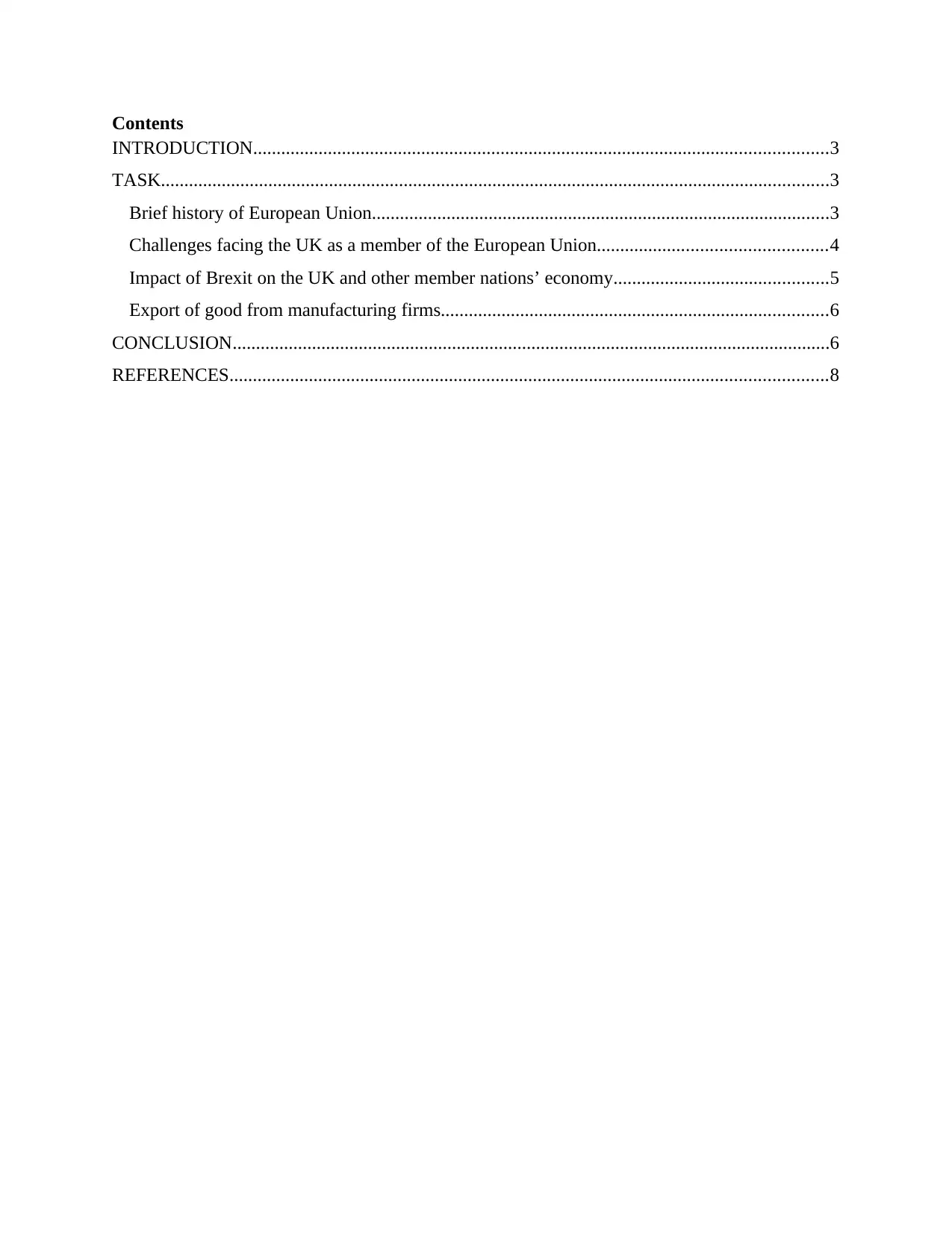
Contents
INTRODUCTION...........................................................................................................................3
TASK...............................................................................................................................................3
Brief history of European Union..................................................................................................3
Challenges facing the UK as a member of the European Union.................................................4
Impact of Brexit on the UK and other member nations’ economy..............................................5
Export of good from manufacturing firms...................................................................................6
CONCLUSION................................................................................................................................6
REFERENCES................................................................................................................................8
INTRODUCTION...........................................................................................................................3
TASK...............................................................................................................................................3
Brief history of European Union..................................................................................................3
Challenges facing the UK as a member of the European Union.................................................4
Impact of Brexit on the UK and other member nations’ economy..............................................5
Export of good from manufacturing firms...................................................................................6
CONCLUSION................................................................................................................................6
REFERENCES................................................................................................................................8
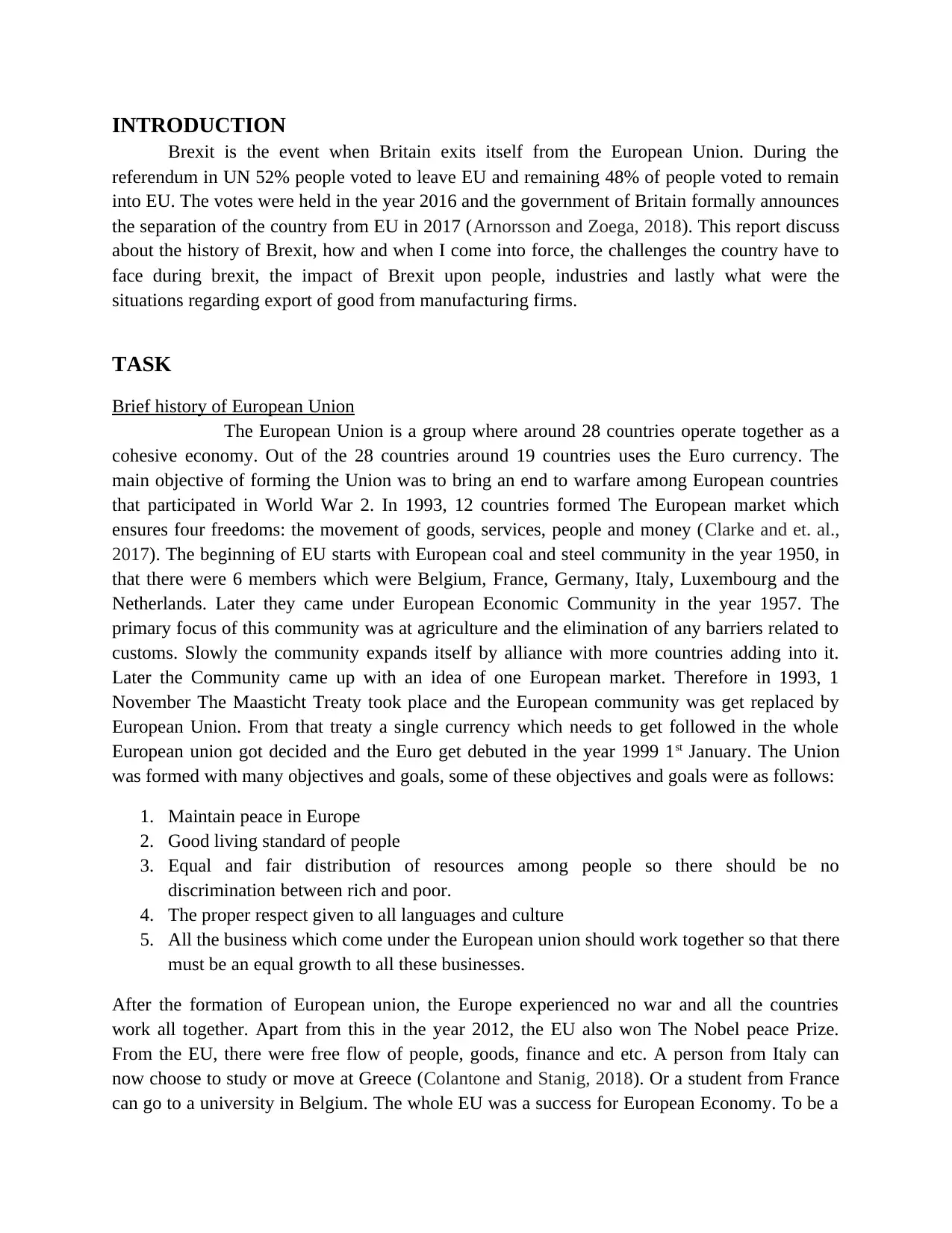
INTRODUCTION
Brexit is the event when Britain exits itself from the European Union. During the
referendum in UN 52% people voted to leave EU and remaining 48% of people voted to remain
into EU. The votes were held in the year 2016 and the government of Britain formally announces
the separation of the country from EU in 2017 (Arnorsson and Zoega, 2018). This report discuss
about the history of Brexit, how and when I come into force, the challenges the country have to
face during brexit, the impact of Brexit upon people, industries and lastly what were the
situations regarding export of good from manufacturing firms.
TASK
Brief history of European Union
The European Union is a group where around 28 countries operate together as a
cohesive economy. Out of the 28 countries around 19 countries uses the Euro currency. The
main objective of forming the Union was to bring an end to warfare among European countries
that participated in World War 2. In 1993, 12 countries formed The European market which
ensures four freedoms: the movement of goods, services, people and money (Clarke and et. al.,
2017). The beginning of EU starts with European coal and steel community in the year 1950, in
that there were 6 members which were Belgium, France, Germany, Italy, Luxembourg and the
Netherlands. Later they came under European Economic Community in the year 1957. The
primary focus of this community was at agriculture and the elimination of any barriers related to
customs. Slowly the community expands itself by alliance with more countries adding into it.
Later the Community came up with an idea of one European market. Therefore in 1993, 1
November The Maasticht Treaty took place and the European community was get replaced by
European Union. From that treaty a single currency which needs to get followed in the whole
European union got decided and the Euro get debuted in the year 1999 1st January. The Union
was formed with many objectives and goals, some of these objectives and goals were as follows:
1. Maintain peace in Europe
2. Good living standard of people
3. Equal and fair distribution of resources among people so there should be no
discrimination between rich and poor.
4. The proper respect given to all languages and culture
5. All the business which come under the European union should work together so that there
must be an equal growth to all these businesses.
After the formation of European union, the Europe experienced no war and all the countries
work all together. Apart from this in the year 2012, the EU also won The Nobel peace Prize.
From the EU, there were free flow of people, goods, finance and etc. A person from Italy can
now choose to study or move at Greece (Colantone and Stanig, 2018). Or a student from France
can go to a university in Belgium. The whole EU was a success for European Economy. To be a
Brexit is the event when Britain exits itself from the European Union. During the
referendum in UN 52% people voted to leave EU and remaining 48% of people voted to remain
into EU. The votes were held in the year 2016 and the government of Britain formally announces
the separation of the country from EU in 2017 (Arnorsson and Zoega, 2018). This report discuss
about the history of Brexit, how and when I come into force, the challenges the country have to
face during brexit, the impact of Brexit upon people, industries and lastly what were the
situations regarding export of good from manufacturing firms.
TASK
Brief history of European Union
The European Union is a group where around 28 countries operate together as a
cohesive economy. Out of the 28 countries around 19 countries uses the Euro currency. The
main objective of forming the Union was to bring an end to warfare among European countries
that participated in World War 2. In 1993, 12 countries formed The European market which
ensures four freedoms: the movement of goods, services, people and money (Clarke and et. al.,
2017). The beginning of EU starts with European coal and steel community in the year 1950, in
that there were 6 members which were Belgium, France, Germany, Italy, Luxembourg and the
Netherlands. Later they came under European Economic Community in the year 1957. The
primary focus of this community was at agriculture and the elimination of any barriers related to
customs. Slowly the community expands itself by alliance with more countries adding into it.
Later the Community came up with an idea of one European market. Therefore in 1993, 1
November The Maasticht Treaty took place and the European community was get replaced by
European Union. From that treaty a single currency which needs to get followed in the whole
European union got decided and the Euro get debuted in the year 1999 1st January. The Union
was formed with many objectives and goals, some of these objectives and goals were as follows:
1. Maintain peace in Europe
2. Good living standard of people
3. Equal and fair distribution of resources among people so there should be no
discrimination between rich and poor.
4. The proper respect given to all languages and culture
5. All the business which come under the European union should work together so that there
must be an equal growth to all these businesses.
After the formation of European union, the Europe experienced no war and all the countries
work all together. Apart from this in the year 2012, the EU also won The Nobel peace Prize.
From the EU, there were free flow of people, goods, finance and etc. A person from Italy can
now choose to study or move at Greece (Colantone and Stanig, 2018). Or a student from France
can go to a university in Belgium. The whole EU was a success for European Economy. To be a
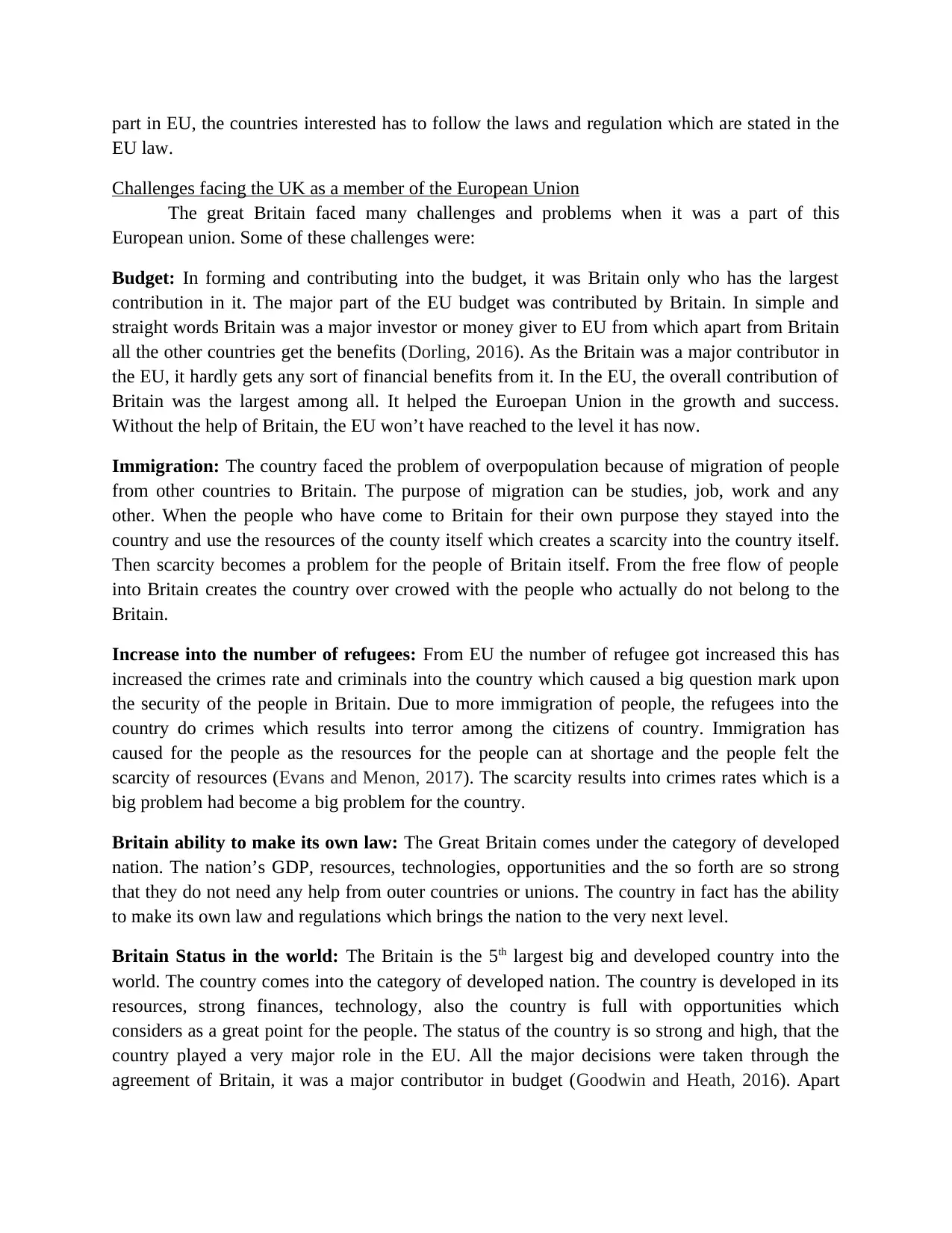
part in EU, the countries interested has to follow the laws and regulation which are stated in the
EU law.
Challenges facing the UK as a member of the European Union
The great Britain faced many challenges and problems when it was a part of this
European union. Some of these challenges were:
Budget: In forming and contributing into the budget, it was Britain only who has the largest
contribution in it. The major part of the EU budget was contributed by Britain. In simple and
straight words Britain was a major investor or money giver to EU from which apart from Britain
all the other countries get the benefits (Dorling, 2016). As the Britain was a major contributor in
the EU, it hardly gets any sort of financial benefits from it. In the EU, the overall contribution of
Britain was the largest among all. It helped the Euroepan Union in the growth and success.
Without the help of Britain, the EU won’t have reached to the level it has now.
Immigration: The country faced the problem of overpopulation because of migration of people
from other countries to Britain. The purpose of migration can be studies, job, work and any
other. When the people who have come to Britain for their own purpose they stayed into the
country and use the resources of the county itself which creates a scarcity into the country itself.
Then scarcity becomes a problem for the people of Britain itself. From the free flow of people
into Britain creates the country over crowed with the people who actually do not belong to the
Britain.
Increase into the number of refugees: From EU the number of refugee got increased this has
increased the crimes rate and criminals into the country which caused a big question mark upon
the security of the people in Britain. Due to more immigration of people, the refugees into the
country do crimes which results into terror among the citizens of country. Immigration has
caused for the people as the resources for the people can at shortage and the people felt the
scarcity of resources (Evans and Menon, 2017). The scarcity results into crimes rates which is a
big problem had become a big problem for the country.
Britain ability to make its own law: The Great Britain comes under the category of developed
nation. The nation’s GDP, resources, technologies, opportunities and the so forth are so strong
that they do not need any help from outer countries or unions. The country in fact has the ability
to make its own law and regulations which brings the nation to the very next level.
Britain Status in the world: The Britain is the 5th largest big and developed country into the
world. The country comes into the category of developed nation. The country is developed in its
resources, strong finances, technology, also the country is full with opportunities which
considers as a great point for the people. The status of the country is so strong and high, that the
country played a very major role in the EU. All the major decisions were taken through the
agreement of Britain, it was a major contributor in budget (Goodwin and Heath, 2016). Apart
EU law.
Challenges facing the UK as a member of the European Union
The great Britain faced many challenges and problems when it was a part of this
European union. Some of these challenges were:
Budget: In forming and contributing into the budget, it was Britain only who has the largest
contribution in it. The major part of the EU budget was contributed by Britain. In simple and
straight words Britain was a major investor or money giver to EU from which apart from Britain
all the other countries get the benefits (Dorling, 2016). As the Britain was a major contributor in
the EU, it hardly gets any sort of financial benefits from it. In the EU, the overall contribution of
Britain was the largest among all. It helped the Euroepan Union in the growth and success.
Without the help of Britain, the EU won’t have reached to the level it has now.
Immigration: The country faced the problem of overpopulation because of migration of people
from other countries to Britain. The purpose of migration can be studies, job, work and any
other. When the people who have come to Britain for their own purpose they stayed into the
country and use the resources of the county itself which creates a scarcity into the country itself.
Then scarcity becomes a problem for the people of Britain itself. From the free flow of people
into Britain creates the country over crowed with the people who actually do not belong to the
Britain.
Increase into the number of refugees: From EU the number of refugee got increased this has
increased the crimes rate and criminals into the country which caused a big question mark upon
the security of the people in Britain. Due to more immigration of people, the refugees into the
country do crimes which results into terror among the citizens of country. Immigration has
caused for the people as the resources for the people can at shortage and the people felt the
scarcity of resources (Evans and Menon, 2017). The scarcity results into crimes rates which is a
big problem had become a big problem for the country.
Britain ability to make its own law: The Great Britain comes under the category of developed
nation. The nation’s GDP, resources, technologies, opportunities and the so forth are so strong
that they do not need any help from outer countries or unions. The country in fact has the ability
to make its own law and regulations which brings the nation to the very next level.
Britain Status in the world: The Britain is the 5th largest big and developed country into the
world. The country comes into the category of developed nation. The country is developed in its
resources, strong finances, technology, also the country is full with opportunities which
considers as a great point for the people. The status of the country is so strong and high, that the
country played a very major role in the EU. All the major decisions were taken through the
agreement of Britain, it was a major contributor in budget (Goodwin and Heath, 2016). Apart
Secure Best Marks with AI Grader
Need help grading? Try our AI Grader for instant feedback on your assignments.
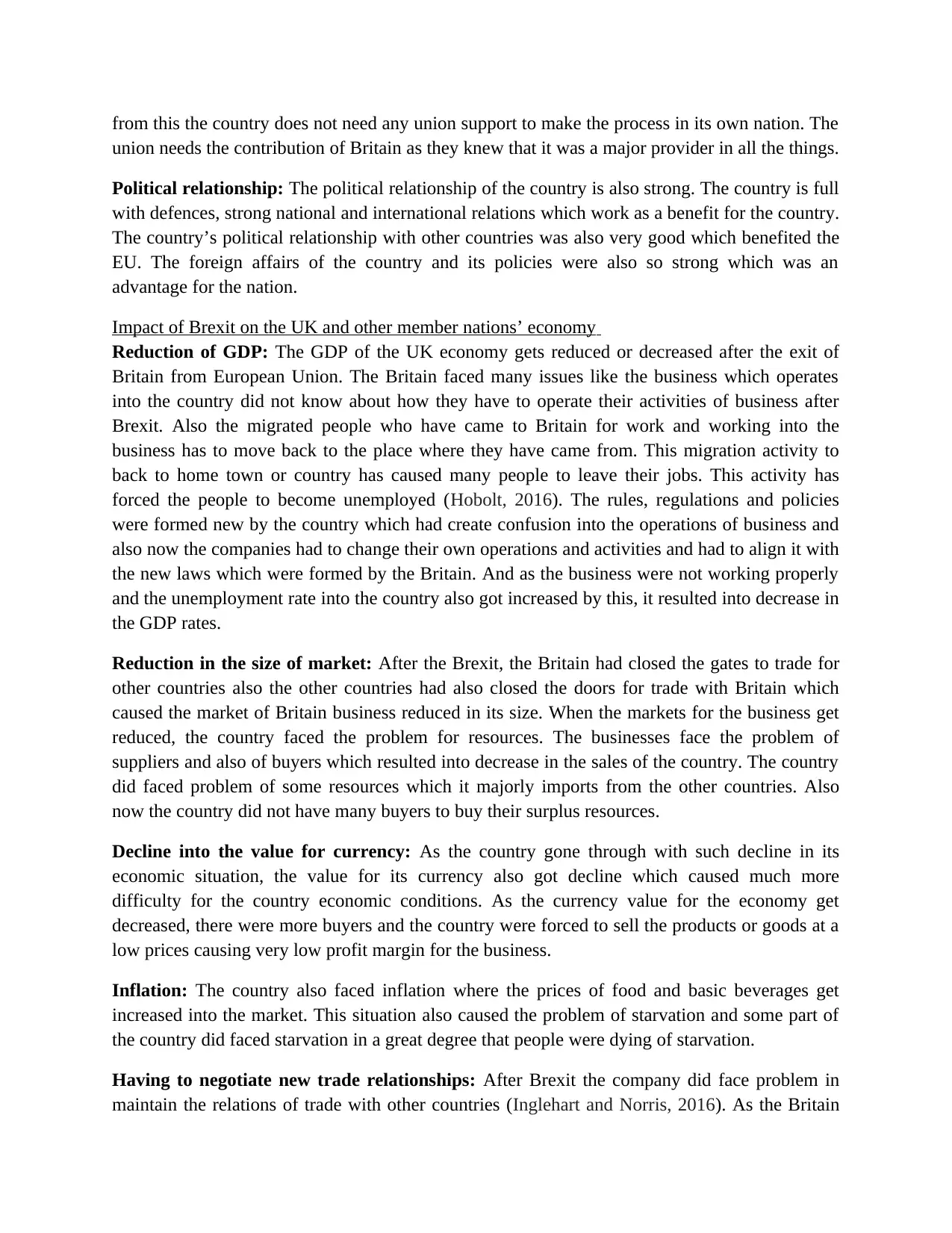
from this the country does not need any union support to make the process in its own nation. The
union needs the contribution of Britain as they knew that it was a major provider in all the things.
Political relationship: The political relationship of the country is also strong. The country is full
with defences, strong national and international relations which work as a benefit for the country.
The country’s political relationship with other countries was also very good which benefited the
EU. The foreign affairs of the country and its policies were also so strong which was an
advantage for the nation.
Impact of Brexit on the UK and other member nations’ economy
Reduction of GDP: The GDP of the UK economy gets reduced or decreased after the exit of
Britain from European Union. The Britain faced many issues like the business which operates
into the country did not know about how they have to operate their activities of business after
Brexit. Also the migrated people who have came to Britain for work and working into the
business has to move back to the place where they have came from. This migration activity to
back to home town or country has caused many people to leave their jobs. This activity has
forced the people to become unemployed (Hobolt, 2016). The rules, regulations and policies
were formed new by the country which had create confusion into the operations of business and
also now the companies had to change their own operations and activities and had to align it with
the new laws which were formed by the Britain. And as the business were not working properly
and the unemployment rate into the country also got increased by this, it resulted into decrease in
the GDP rates.
Reduction in the size of market: After the Brexit, the Britain had closed the gates to trade for
other countries also the other countries had also closed the doors for trade with Britain which
caused the market of Britain business reduced in its size. When the markets for the business get
reduced, the country faced the problem for resources. The businesses face the problem of
suppliers and also of buyers which resulted into decrease in the sales of the country. The country
did faced problem of some resources which it majorly imports from the other countries. Also
now the country did not have many buyers to buy their surplus resources.
Decline into the value for currency: As the country gone through with such decline in its
economic situation, the value for its currency also got decline which caused much more
difficulty for the country economic conditions. As the currency value for the economy get
decreased, there were more buyers and the country were forced to sell the products or goods at a
low prices causing very low profit margin for the business.
Inflation: The country also faced inflation where the prices of food and basic beverages get
increased into the market. This situation also caused the problem of starvation and some part of
the country did faced starvation in a great degree that people were dying of starvation.
Having to negotiate new trade relationships: After Brexit the company did face problem in
maintain the relations of trade with other countries (Inglehart and Norris, 2016). As the Britain
union needs the contribution of Britain as they knew that it was a major provider in all the things.
Political relationship: The political relationship of the country is also strong. The country is full
with defences, strong national and international relations which work as a benefit for the country.
The country’s political relationship with other countries was also very good which benefited the
EU. The foreign affairs of the country and its policies were also so strong which was an
advantage for the nation.
Impact of Brexit on the UK and other member nations’ economy
Reduction of GDP: The GDP of the UK economy gets reduced or decreased after the exit of
Britain from European Union. The Britain faced many issues like the business which operates
into the country did not know about how they have to operate their activities of business after
Brexit. Also the migrated people who have came to Britain for work and working into the
business has to move back to the place where they have came from. This migration activity to
back to home town or country has caused many people to leave their jobs. This activity has
forced the people to become unemployed (Hobolt, 2016). The rules, regulations and policies
were formed new by the country which had create confusion into the operations of business and
also now the companies had to change their own operations and activities and had to align it with
the new laws which were formed by the Britain. And as the business were not working properly
and the unemployment rate into the country also got increased by this, it resulted into decrease in
the GDP rates.
Reduction in the size of market: After the Brexit, the Britain had closed the gates to trade for
other countries also the other countries had also closed the doors for trade with Britain which
caused the market of Britain business reduced in its size. When the markets for the business get
reduced, the country faced the problem for resources. The businesses face the problem of
suppliers and also of buyers which resulted into decrease in the sales of the country. The country
did faced problem of some resources which it majorly imports from the other countries. Also
now the country did not have many buyers to buy their surplus resources.
Decline into the value for currency: As the country gone through with such decline in its
economic situation, the value for its currency also got decline which caused much more
difficulty for the country economic conditions. As the currency value for the economy get
decreased, there were more buyers and the country were forced to sell the products or goods at a
low prices causing very low profit margin for the business.
Inflation: The country also faced inflation where the prices of food and basic beverages get
increased into the market. This situation also caused the problem of starvation and some part of
the country did faced starvation in a great degree that people were dying of starvation.
Having to negotiate new trade relationships: After Brexit the company did face problem in
maintain the relations of trade with other countries (Inglehart and Norris, 2016). As the Britain
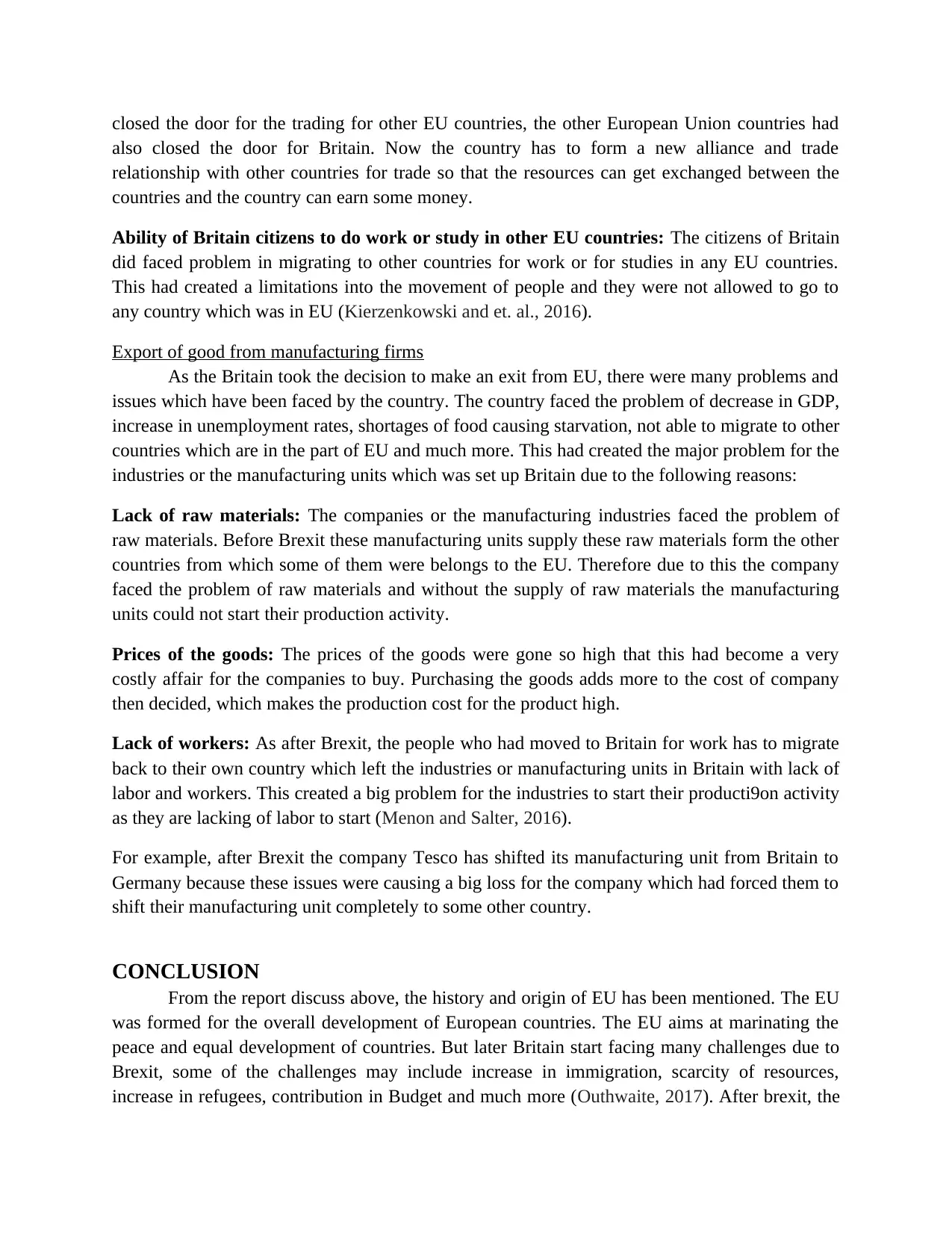
closed the door for the trading for other EU countries, the other European Union countries had
also closed the door for Britain. Now the country has to form a new alliance and trade
relationship with other countries for trade so that the resources can get exchanged between the
countries and the country can earn some money.
Ability of Britain citizens to do work or study in other EU countries: The citizens of Britain
did faced problem in migrating to other countries for work or for studies in any EU countries.
This had created a limitations into the movement of people and they were not allowed to go to
any country which was in EU (Kierzenkowski and et. al., 2016).
Export of good from manufacturing firms
As the Britain took the decision to make an exit from EU, there were many problems and
issues which have been faced by the country. The country faced the problem of decrease in GDP,
increase in unemployment rates, shortages of food causing starvation, not able to migrate to other
countries which are in the part of EU and much more. This had created the major problem for the
industries or the manufacturing units which was set up Britain due to the following reasons:
Lack of raw materials: The companies or the manufacturing industries faced the problem of
raw materials. Before Brexit these manufacturing units supply these raw materials form the other
countries from which some of them were belongs to the EU. Therefore due to this the company
faced the problem of raw materials and without the supply of raw materials the manufacturing
units could not start their production activity.
Prices of the goods: The prices of the goods were gone so high that this had become a very
costly affair for the companies to buy. Purchasing the goods adds more to the cost of company
then decided, which makes the production cost for the product high.
Lack of workers: As after Brexit, the people who had moved to Britain for work has to migrate
back to their own country which left the industries or manufacturing units in Britain with lack of
labor and workers. This created a big problem for the industries to start their producti9on activity
as they are lacking of labor to start (Menon and Salter, 2016).
For example, after Brexit the company Tesco has shifted its manufacturing unit from Britain to
Germany because these issues were causing a big loss for the company which had forced them to
shift their manufacturing unit completely to some other country.
CONCLUSION
From the report discuss above, the history and origin of EU has been mentioned. The EU
was formed for the overall development of European countries. The EU aims at marinating the
peace and equal development of countries. But later Britain start facing many challenges due to
Brexit, some of the challenges may include increase in immigration, scarcity of resources,
increase in refugees, contribution in Budget and much more (Outhwaite, 2017). After brexit, the
also closed the door for Britain. Now the country has to form a new alliance and trade
relationship with other countries for trade so that the resources can get exchanged between the
countries and the country can earn some money.
Ability of Britain citizens to do work or study in other EU countries: The citizens of Britain
did faced problem in migrating to other countries for work or for studies in any EU countries.
This had created a limitations into the movement of people and they were not allowed to go to
any country which was in EU (Kierzenkowski and et. al., 2016).
Export of good from manufacturing firms
As the Britain took the decision to make an exit from EU, there were many problems and
issues which have been faced by the country. The country faced the problem of decrease in GDP,
increase in unemployment rates, shortages of food causing starvation, not able to migrate to other
countries which are in the part of EU and much more. This had created the major problem for the
industries or the manufacturing units which was set up Britain due to the following reasons:
Lack of raw materials: The companies or the manufacturing industries faced the problem of
raw materials. Before Brexit these manufacturing units supply these raw materials form the other
countries from which some of them were belongs to the EU. Therefore due to this the company
faced the problem of raw materials and without the supply of raw materials the manufacturing
units could not start their production activity.
Prices of the goods: The prices of the goods were gone so high that this had become a very
costly affair for the companies to buy. Purchasing the goods adds more to the cost of company
then decided, which makes the production cost for the product high.
Lack of workers: As after Brexit, the people who had moved to Britain for work has to migrate
back to their own country which left the industries or manufacturing units in Britain with lack of
labor and workers. This created a big problem for the industries to start their producti9on activity
as they are lacking of labor to start (Menon and Salter, 2016).
For example, after Brexit the company Tesco has shifted its manufacturing unit from Britain to
Germany because these issues were causing a big loss for the company which had forced them to
shift their manufacturing unit completely to some other country.
CONCLUSION
From the report discuss above, the history and origin of EU has been mentioned. The EU
was formed for the overall development of European countries. The EU aims at marinating the
peace and equal development of countries. But later Britain start facing many challenges due to
Brexit, some of the challenges may include increase in immigration, scarcity of resources,
increase in refugees, contribution in Budget and much more (Outhwaite, 2017). After brexit, the
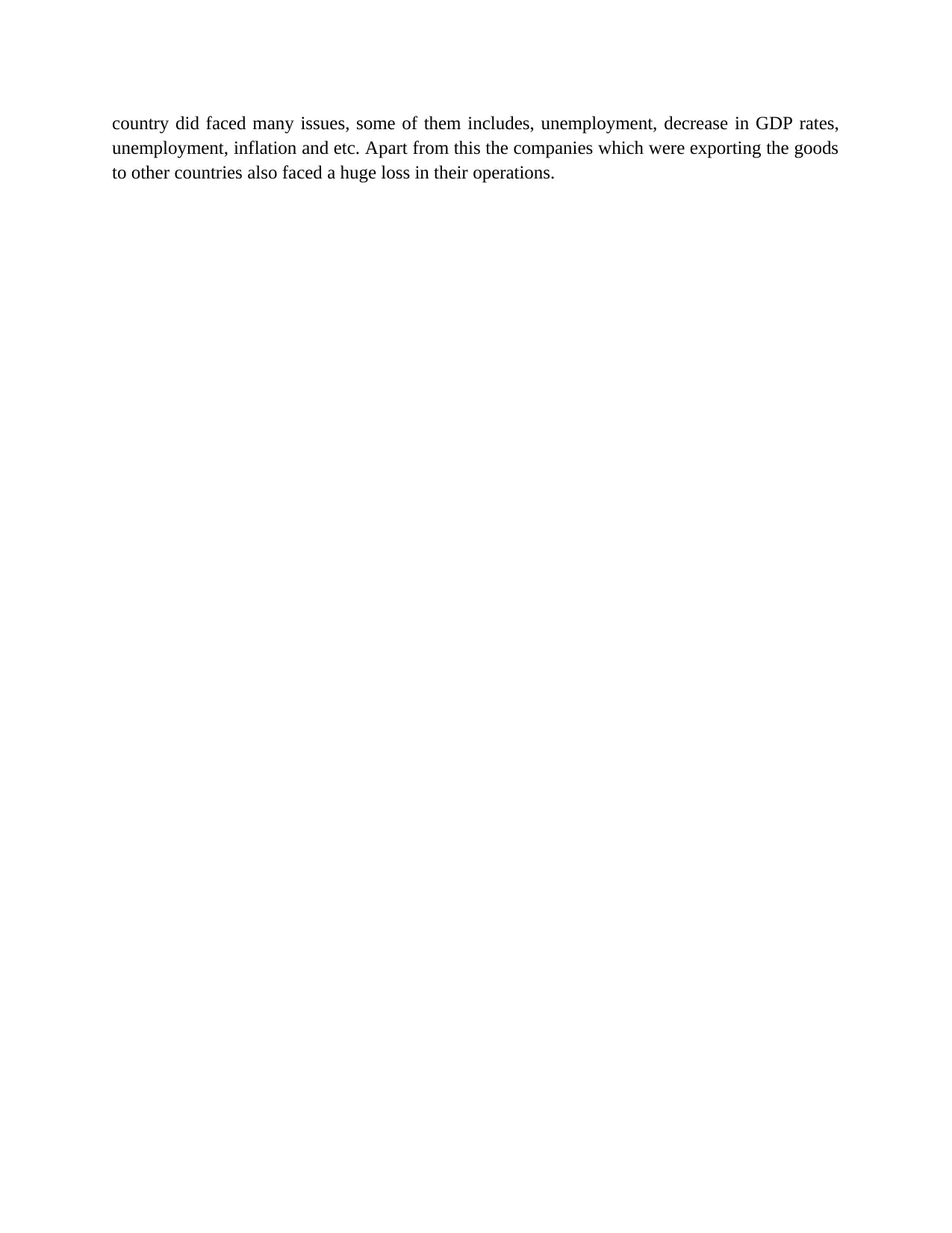
country did faced many issues, some of them includes, unemployment, decrease in GDP rates,
unemployment, inflation and etc. Apart from this the companies which were exporting the goods
to other countries also faced a huge loss in their operations.
unemployment, inflation and etc. Apart from this the companies which were exporting the goods
to other countries also faced a huge loss in their operations.
Paraphrase This Document
Need a fresh take? Get an instant paraphrase of this document with our AI Paraphraser
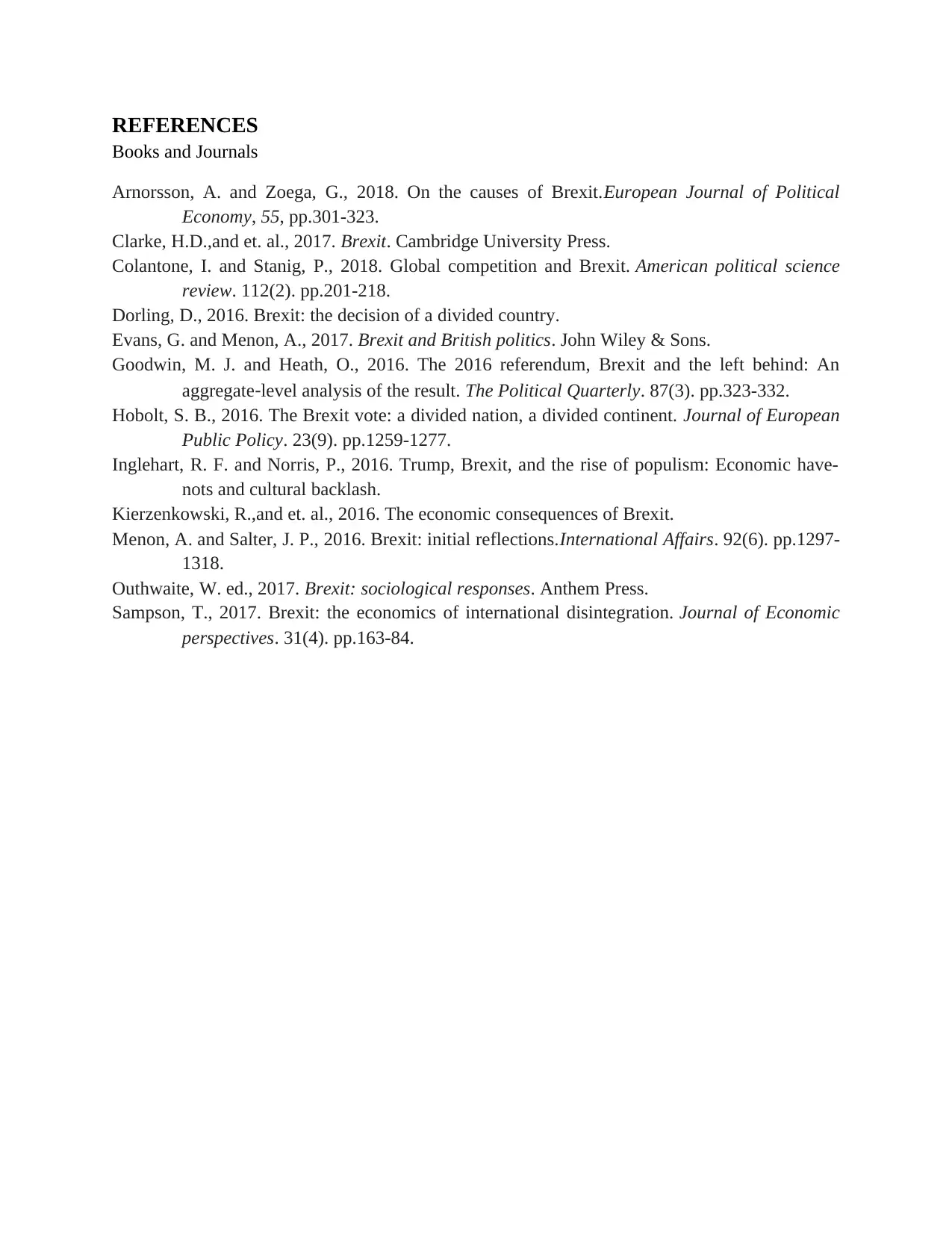
REFERENCES
Books and Journals
Arnorsson, A. and Zoega, G., 2018. On the causes of Brexit.European Journal of Political
Economy, 55, pp.301-323.
Clarke, H.D.,and et. al., 2017. Brexit. Cambridge University Press.
Colantone, I. and Stanig, P., 2018. Global competition and Brexit. American political science
review. 112(2). pp.201-218.
Dorling, D., 2016. Brexit: the decision of a divided country.
Evans, G. and Menon, A., 2017. Brexit and British politics. John Wiley & Sons.
Goodwin, M. J. and Heath, O., 2016. The 2016 referendum, Brexit and the left behind: An
aggregate‐level analysis of the result. The Political Quarterly. 87(3). pp.323-332.
Hobolt, S. B., 2016. The Brexit vote: a divided nation, a divided continent. Journal of European
Public Policy. 23(9). pp.1259-1277.
Inglehart, R. F. and Norris, P., 2016. Trump, Brexit, and the rise of populism: Economic have-
nots and cultural backlash.
Kierzenkowski, R.,and et. al., 2016. The economic consequences of Brexit.
Menon, A. and Salter, J. P., 2016. Brexit: initial reflections.International Affairs. 92(6). pp.1297-
1318.
Outhwaite, W. ed., 2017. Brexit: sociological responses. Anthem Press.
Sampson, T., 2017. Brexit: the economics of international disintegration. Journal of Economic
perspectives. 31(4). pp.163-84.
Books and Journals
Arnorsson, A. and Zoega, G., 2018. On the causes of Brexit.European Journal of Political
Economy, 55, pp.301-323.
Clarke, H.D.,and et. al., 2017. Brexit. Cambridge University Press.
Colantone, I. and Stanig, P., 2018. Global competition and Brexit. American political science
review. 112(2). pp.201-218.
Dorling, D., 2016. Brexit: the decision of a divided country.
Evans, G. and Menon, A., 2017. Brexit and British politics. John Wiley & Sons.
Goodwin, M. J. and Heath, O., 2016. The 2016 referendum, Brexit and the left behind: An
aggregate‐level analysis of the result. The Political Quarterly. 87(3). pp.323-332.
Hobolt, S. B., 2016. The Brexit vote: a divided nation, a divided continent. Journal of European
Public Policy. 23(9). pp.1259-1277.
Inglehart, R. F. and Norris, P., 2016. Trump, Brexit, and the rise of populism: Economic have-
nots and cultural backlash.
Kierzenkowski, R.,and et. al., 2016. The economic consequences of Brexit.
Menon, A. and Salter, J. P., 2016. Brexit: initial reflections.International Affairs. 92(6). pp.1297-
1318.
Outhwaite, W. ed., 2017. Brexit: sociological responses. Anthem Press.
Sampson, T., 2017. Brexit: the economics of international disintegration. Journal of Economic
perspectives. 31(4). pp.163-84.
1 out of 8
Related Documents
Your All-in-One AI-Powered Toolkit for Academic Success.
+13062052269
info@desklib.com
Available 24*7 on WhatsApp / Email
![[object Object]](/_next/static/media/star-bottom.7253800d.svg)
Unlock your academic potential
© 2024 | Zucol Services PVT LTD | All rights reserved.





